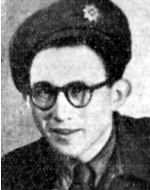Dov, the son of Berta (Shezi) and Chaim, was born on October 2, 1925 in Poland, in the city of Dukla in the Lvov district. His father was a ritual slaughterer and cantor. After graduating from elementary school, he traveled to southern Poland, to the city of Tarnow, east of Krakow, to continue his yeshiva studies. In Tarnow there were about 25,000 Jews on the eve of World War II. In the community there was extensive activity in the fields of education and culture, despite the dire economic situation of its Jews. When the war broke out, in September 1939, thousands of Jewish refugees arrived from western Poland. Many continued to flee eastward as the Germans advanced. From the first day of the city’s conquest, September 8, 1939, the Wehrmacht began to abuse Jews, kidnapping them for forced labor, and stealing property. In early November 1939, a Judenrat was set up, whose members made tremendous efforts to ease the distress of the community and provide shelter for the refugees. In the spring of 1940, the decrees imposed on the Tarnow community increased, and in 1941 many Jews were arrested and executed. The Aktionen began in June 1942, when the ghetto was also established. Many thousands were sent to the Belzec extermination camp, where they were murdered in gas chambers. In October 1942, Jews from the surrounding settlements were brought to the ghetto in Tarnow and the number of its inhabitants reached 15,000. The wave of deportations to the Belzec camp continued. The final liquidation of the Tarnow ghetto began in early September 1943. By the end of the war almost all the Jews of Tarnow had been exterminated. About three million Polish Jews were exterminated in the Holocaust. Dov’s parents were murdered in Belzec. He was sent to the Czestochowa camp in the Kielce district of Poland, where he was forced to work in a quarry. During 1943 he was sent to a camp in Germany, and later wandered among many concentration camps, the last of which was Buchenwald. In all the camps he was very resourceful, managed to hold on to any professional work and thus survived and reached the day of liberation. After the liberation, Dov moved to Belgium and joined the training of the “Badatz” (Religious Pioneers Union) in Kfar Lev, where he studied and trained in the Haganah, and in the spring of 1946 he managed to reach Egypt, disguised as a soldier of the Jewish Brigade. He was sent to Kibbutz Barot Yitzhak and then moved to Kfar Etzion, the first settlement in Gush Etzion, where he worked in preparing the land and was sent by the group to the religious seminar of the Religious Kibbutz Movement. Gush Etzion was included within the Jewish state, and immediately after the decision, the Arabs of the area began to harass the Gush settlements, even before the establishment of the State of Israel During the British Mandate period, the Jordanian Legion invaded the area, and together with the surrounding Arabs, they attacked the Gush settlements and the roads to them from Jerusalem, as did all members of the old Yishuv. Number 6 (“Jerusalem” Brigade) – most of whose fighters came from Jerusalem and the surrounding areas, and in anticipation of the decisive battles in the Haganah area, reinforced the Etzion bloc with fighters from the Etzioni Brigade and the Field Corps from Jerusalem. , Were transferred to the Palmach fighters from the Harel Brigade. On May 12, 1948, the Arab forces attacked the Gush. On the following day, 4 May 1948, an armored Jordanian force attacked Kfar Etzion, and a large number of Arabs from the nearby villages joined the attack and conquered the settlement, and at the time of the last attack Dov was standing near the gate of the settlement, Two days later, when Molotov cocktails were thrown at the gates of the village, Molotov cocktails were thrown at them and they tried to use the machine gun, but they did not succeed.In the remaining Gush Etzion bloc. The bloc ceased to exist, and the remnants of its defenders were captured by the Jordanians. Dov was twenty-three when he fell. The bodies could not be evacuated after the fall of the Gush. The remains of the fallen were collected by the military rabbinate only in 1949 and brought to eternal rest in a large mass grave on Mount Herzl in Jerusalem in a state ceremony held on the 17th of Cheshvan 5710 (17.11.1949). This hero is a “last scion”. The survivors of the Holocaust are survivors of the Holocaust who survived the last remnant of their nuclear family (parents, brothers, sisters, sons and daughters) who experienced the Holocaust in the ghettos and / or concentration camps and / or in hiding and hiding in territories occupied by the Nazis and / Or in combat alongside members of the underground movements or partisans in the Nazi-occupied territories who immigrated to Israel during or after World War II, wore uniforms and fell in the Israeli army.
